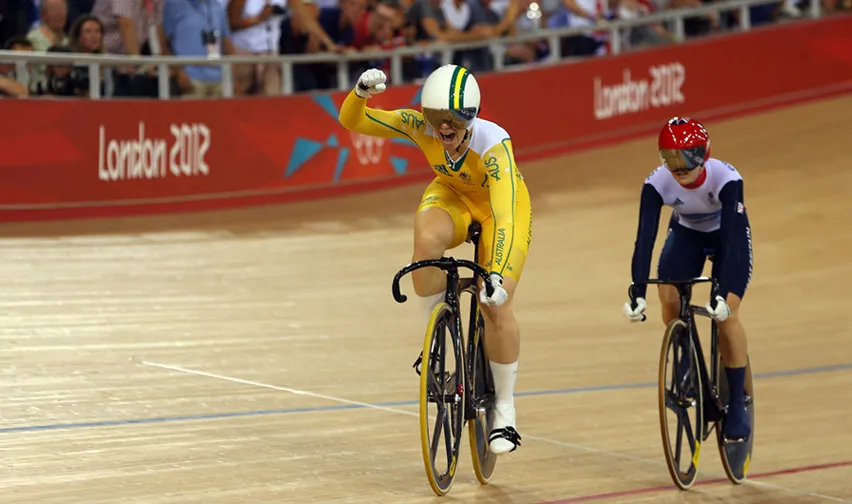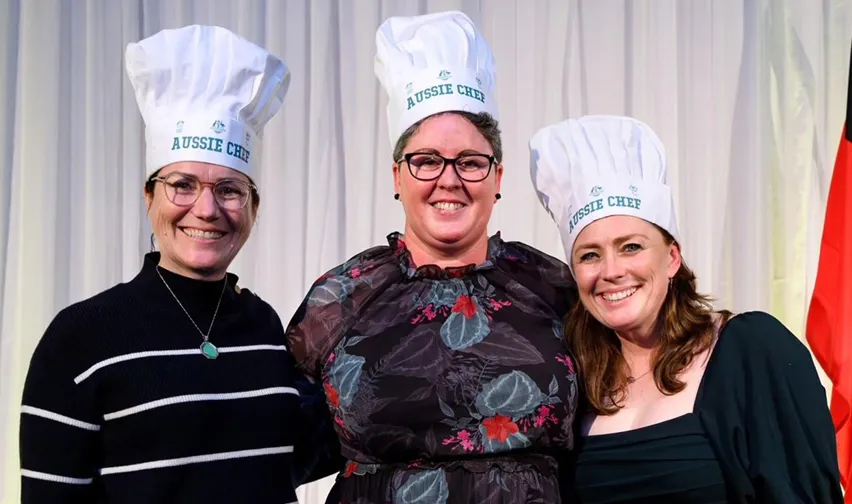
Despite six medals from four Olympics, Australia’s Chef de Mission is well-placed to mentor and counsel athletes through the good times and bad.
Like winning gold at the 2012 London Games in the days after the “worst race of my career and absolutely stuffing up the Kieran as world champion”.
Or when she completed one of the greatest comebacks in Australian Olympic history to claim silver in Beijing in 2008, after crashing at 65km/h and breaking her neck seven months earlier.
|
Our latest news, resources, podcasts, courses and webinars:
|
Meares describes her role leading the Australian team as “multi-faceted”.
“My role is to build relationships with the sports, the coaches, the athletes and the high-performance directors so that I understand what the nuances of each sport are, what sort of support mechanisms they have in place, what they require for competition to be able to be as smooth as possible,” she says.
“Then I take that information and I’ll work with my team at the AOC [Australian Olympic Committee] and build the environment and the culture for the team and put those structures in place.
My job is to take as much off the athletes’ plate as possible so they can just go ahead and do what they are exceptional at doing and getting the best out of themselves.
With more than 450 athletes spread across 35 venues from the Eiffel Tower Stadium to the Stade de France to the Château de Versailles, not to mention surfing in Tahiti, Paris 2024 is a logistical nightmare for any Chef de Mission.
To help her achieve this she has built an impressive leadership team around her with Olympians Mark Knowles, Kaarle McCulloch, Bronwen Knox, Kyle Vander Kuyp and Ken Wallace.
“I think it will be a great Games like any Games, it will have its challenges, that’s fine. But we have a really experienced team that’s capable of adjusting very quickly to circumstances as they arise, and we’ll do that as each occasion arises.”
Having experienced the excitement as a rookie of trying to win and as a matriarchal figure fearing what would happen if she didn’t – she appreciates the different pressures and anxieties of a Games.
Despite her own medal haul, Meares insists there’ll be no medal target set for the Games − something she said she would’ve loved when she was competing.
“Success can be winning a silver, winning a bronze, making a final, performing a personal best, an act of sportsmanship or sportswomanship [or] making the team. There are a lot of people who don’t get the opportunity to make the team to be an Australian Olympian.”
So how does one of Australia’s most successful Olympians sell this message to our athletes?
“Why do I have this outlook and philosophy?” she asks. “Like everything in life, there is a whole lot that happens behind the scenes that people don’t realise and that can affect how people see what that success looks like at the time.”
Take Beijing and that aforementioned crash. Or Rio where she finished a tyre-width behind Great Britain’s Rebecca James to win bronze in the keirin and become the first Australian athlete to win individual medals at four consecutive Games.
“I came home from my fourth Games with the bronze medal, which I was so proud of, and it was so hard to earn, and a lot of people said to me ‘we’re sorry, you must be disappointed you didn’t win gold’.
“We can devalue or discredit the achievement of silver, of the bronze, of making the final or a personal best… it’s having those conversations and keeping it real but I’m also appreciating that expectation and hope is different for everyone.”
She was the flag-bearer and captain of the Australian team in Rio, an opportunity she was grateful for and one that helped change her outlook. It is not lost on Meares that she has the responsibility of bestowing that honour in Paris.
“I remember what that moment was like for me when Kitty [Chiller] asked me to be the flag-bearer. I know what that meant to me,” she said.
“I will never forget walking into the stadium in Rio … The wall of noise and the wall of colour that came at us as Australia was announced into that stadium … for me it changed the whole experience of my last Olympic campaign. It took the pressure off. It made me feel like my contribution to sport and Olympic sport, in particular, in Australia, was recognised.”
She is also making history outside of the velodrome, alongside Kate McLoughlin and Petria Thomas – it is the first time Australia has all women leading all the Games teams.
“I’m grateful that Ian Chesterman saw in me a capacity to be a great leader for the Australian Olympic team,” she said. “I’m grateful for Petria, who was Australia’s first female Chef de Mission for the Commonwealth Games, saw something in me to work with her as a general manager.
“Across the board now to see women in these roles − Commonwealth Games, the Paralympic and the Olympic teams is really special. We have a great friendship and connection and support that we provide for each other.
“What I have noticed is that some of the athletes have come to me and said, ‘just seeing you in this role makes me realise there’s opportunity for me when I’m finished competing’ and that really nice to hear.”
She believes the biggest barrier for women is getting experience.
“I was involved in the sport for 20 years and 16 of those years were at the elite high-performance level and my experience was very much athlete-based,” she says.
“So, it was hard to get experience outside of that in roles. So, I was very grateful when Petria offered me that opportunity because I think it started the ball to roll, so to speak, for me to be where I am today.”
She says that it is only now, as Australia’s most decorated cyclist and first Australian to win individual medals at four consecutive Games, that she understands the true status of being an Olympian.
“I feel like I’m growing into being an Olympian and I’m realising that that follows me for life. Being an athlete is for a very short window of time, but being an Olympian follows me for life.”
